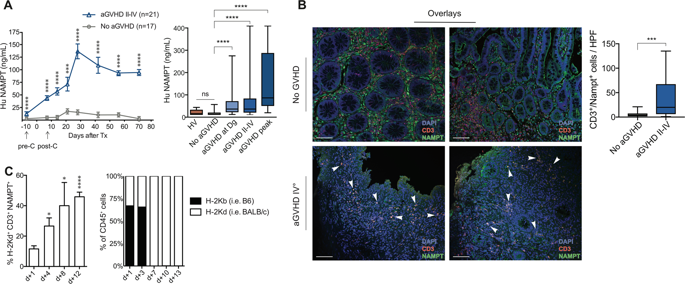Our official English website, www.x-mol.net, welcomes your
feedback! (Note: you will need to create a separate account there.)
Targeting NAD immunometabolism limits severe graft-versus-host disease and has potent antileukemic activity.
Leukemia ( IF 12.8 ) Pub Date : 2020-01-23 , DOI: 10.1038/s41375-020-0709-0 Romana R Gerner 1, 2, 3 , Sophie Macheiner 1, 2 , Simon Reider 2 , Kerstin Siegmund 4 , Felix Grabherr 1 , Lisa Mayr 1 , Bernhard Texler 2 , Patrizia Moser 5 , Maria Effenberger 1 , Hubert Schwaighofer 1 , Alexander R Moschen 1, 2 , Brigitte Kircher 6 , Herbert Oberacher 7 , Robert Zeiser 8 , Herbert Tilg 1 , David Nachbaur 6
Leukemia ( IF 12.8 ) Pub Date : 2020-01-23 , DOI: 10.1038/s41375-020-0709-0 Romana R Gerner 1, 2, 3 , Sophie Macheiner 1, 2 , Simon Reider 2 , Kerstin Siegmund 4 , Felix Grabherr 1 , Lisa Mayr 1 , Bernhard Texler 2 , Patrizia Moser 5 , Maria Effenberger 1 , Hubert Schwaighofer 1 , Alexander R Moschen 1, 2 , Brigitte Kircher 6 , Herbert Oberacher 7 , Robert Zeiser 8 , Herbert Tilg 1 , David Nachbaur 6
Affiliation

|
Acute graft-versus-host disease (aGVHD) and tumor relapse remain major complications after allogeneic hematopoietic stem cell transplantation. Alloreactive T cells and cancer cells share a similar metabolic phenotype to meet the bioenergetic demands necessary for cellular proliferation and effector functions. Nicotinamide adenine dinucleotide (NAD) is an essential co-factor in energy metabolism and is constantly replenished by nicotinamide phosphoribosyl-transferase (Nampt), the rate-limiting enzyme in the NAD salvage pathway. Here we show, that Nampt blockage strongly ameliorates aGVHD and limits leukemic expansion. Nampt was highly elevated in serum of patients with gastrointestinal GVHD and was particularly abundant in human and mouse intestinal T cells. Therapeutic application of the Nampt small-molecule inhibitor, Fk866, strongly attenuated experimental GVHD and caused NAD depletion in T-cell subsets, which displayed differential susceptibility to NAD shortage. Fk866 robustly inhibited expansion of alloreactive but not memory T cells and promoted FoxP3-mediated lineage stability in regulatory T cells. Furthermore, Fk866 strongly reduced the tumor burden in mouse leukemia and graft-versus-leukemia models. Ex vivo studies using lymphocytes from GVHD patients demonstrated potent antiproliferative properties of Fk866, suggesting potential clinical utility. Thus, targeting NAD immunometabolism represents a novel approach to selectively inhibit alloreactive T cells during aGVHD with additional antileukemic efficacy.
中文翻译:

靶向 NAD 免疫代谢可限制严重的移植物抗宿主病并具有有效的抗白血病活性。
急性移植物抗宿主病 (aGVHD) 和肿瘤复发仍然是异基因造血干细胞移植后的主要并发症。同种异体反应性 T 细胞和癌细胞具有相似的代谢表型,以满足细胞增殖和效应功能所需的生物能量需求。烟酰胺腺嘌呤二核苷酸 (NAD) 是能量代谢中必不可少的辅助因子,并且由 NAD 补救途径中的限速酶烟酰胺磷酸核糖基转移酶 (Nampt) 不断补充。在这里,我们表明,Nampt 阻塞可显着改善 aGVHD 并限制白血病扩展。Nampt 在胃肠道 GVHD 患者的血清中高度升高,并且在人和小鼠肠道 T 细胞中特别丰富。Nampt 小分子抑制剂 Fk866 的治疗应用,强烈减弱实验性 GVHD 并导致 T 细胞亚群中的 NAD 耗尽,这显示出对 NAD 短缺的不同易感性。Fk866 强烈抑制同种异体反应而非记忆 T 细胞的扩增,并促进 FoxP3 介导的调节性 T 细胞谱系稳定性。此外,Fk866 显着降低了小鼠白血病和移植物抗白血病模型中的肿瘤负荷。使用来自 GVHD 患者的淋巴细胞的离体研究证明了 Fk866 的有效抗增殖特性,表明潜在的临床实用性。因此,靶向 NAD 免疫代谢代表了一种在 aGVHD 期间选择性抑制同种异体反应性 T 细胞的新方法,具有额外的抗白血病功效。Fk866 强烈抑制同种异体反应而非记忆 T 细胞的扩增,并促进 FoxP3 介导的调节性 T 细胞谱系稳定性。此外,Fk866 显着降低了小鼠白血病和移植物抗白血病模型中的肿瘤负荷。使用来自 GVHD 患者的淋巴细胞的离体研究证明了 Fk866 的有效抗增殖特性,表明潜在的临床实用性。因此,靶向 NAD 免疫代谢代表了一种在 aGVHD 期间选择性抑制同种异体反应性 T 细胞的新方法,具有额外的抗白血病功效。Fk866 强烈抑制同种异体反应而非记忆 T 细胞的扩增,并促进 FoxP3 介导的调节性 T 细胞谱系稳定性。此外,Fk866 显着降低了小鼠白血病和移植物抗白血病模型中的肿瘤负荷。使用来自 GVHD 患者的淋巴细胞的离体研究证明了 Fk866 的有效抗增殖特性,表明潜在的临床实用性。因此,靶向 NAD 免疫代谢代表了一种在 aGVHD 期间选择性抑制同种异体反应性 T 细胞的新方法,具有额外的抗白血病功效。使用来自 GVHD 患者的淋巴细胞的离体研究证明了 Fk866 的有效抗增殖特性,表明潜在的临床实用性。因此,靶向 NAD 免疫代谢代表了一种在 aGVHD 期间选择性抑制同种异体反应性 T 细胞的新方法,具有额外的抗白血病功效。使用来自 GVHD 患者的淋巴细胞的离体研究证明了 Fk866 的有效抗增殖特性,表明潜在的临床实用性。因此,靶向 NAD 免疫代谢代表了一种在 aGVHD 期间选择性抑制同种异体反应性 T 细胞的新方法,具有额外的抗白血病功效。
更新日期:2020-01-23
中文翻译:

靶向 NAD 免疫代谢可限制严重的移植物抗宿主病并具有有效的抗白血病活性。
急性移植物抗宿主病 (aGVHD) 和肿瘤复发仍然是异基因造血干细胞移植后的主要并发症。同种异体反应性 T 细胞和癌细胞具有相似的代谢表型,以满足细胞增殖和效应功能所需的生物能量需求。烟酰胺腺嘌呤二核苷酸 (NAD) 是能量代谢中必不可少的辅助因子,并且由 NAD 补救途径中的限速酶烟酰胺磷酸核糖基转移酶 (Nampt) 不断补充。在这里,我们表明,Nampt 阻塞可显着改善 aGVHD 并限制白血病扩展。Nampt 在胃肠道 GVHD 患者的血清中高度升高,并且在人和小鼠肠道 T 细胞中特别丰富。Nampt 小分子抑制剂 Fk866 的治疗应用,强烈减弱实验性 GVHD 并导致 T 细胞亚群中的 NAD 耗尽,这显示出对 NAD 短缺的不同易感性。Fk866 强烈抑制同种异体反应而非记忆 T 细胞的扩增,并促进 FoxP3 介导的调节性 T 细胞谱系稳定性。此外,Fk866 显着降低了小鼠白血病和移植物抗白血病模型中的肿瘤负荷。使用来自 GVHD 患者的淋巴细胞的离体研究证明了 Fk866 的有效抗增殖特性,表明潜在的临床实用性。因此,靶向 NAD 免疫代谢代表了一种在 aGVHD 期间选择性抑制同种异体反应性 T 细胞的新方法,具有额外的抗白血病功效。Fk866 强烈抑制同种异体反应而非记忆 T 细胞的扩增,并促进 FoxP3 介导的调节性 T 细胞谱系稳定性。此外,Fk866 显着降低了小鼠白血病和移植物抗白血病模型中的肿瘤负荷。使用来自 GVHD 患者的淋巴细胞的离体研究证明了 Fk866 的有效抗增殖特性,表明潜在的临床实用性。因此,靶向 NAD 免疫代谢代表了一种在 aGVHD 期间选择性抑制同种异体反应性 T 细胞的新方法,具有额外的抗白血病功效。Fk866 强烈抑制同种异体反应而非记忆 T 细胞的扩增,并促进 FoxP3 介导的调节性 T 细胞谱系稳定性。此外,Fk866 显着降低了小鼠白血病和移植物抗白血病模型中的肿瘤负荷。使用来自 GVHD 患者的淋巴细胞的离体研究证明了 Fk866 的有效抗增殖特性,表明潜在的临床实用性。因此,靶向 NAD 免疫代谢代表了一种在 aGVHD 期间选择性抑制同种异体反应性 T 细胞的新方法,具有额外的抗白血病功效。使用来自 GVHD 患者的淋巴细胞的离体研究证明了 Fk866 的有效抗增殖特性,表明潜在的临床实用性。因此,靶向 NAD 免疫代谢代表了一种在 aGVHD 期间选择性抑制同种异体反应性 T 细胞的新方法,具有额外的抗白血病功效。使用来自 GVHD 患者的淋巴细胞的离体研究证明了 Fk866 的有效抗增殖特性,表明潜在的临床实用性。因此,靶向 NAD 免疫代谢代表了一种在 aGVHD 期间选择性抑制同种异体反应性 T 细胞的新方法,具有额外的抗白血病功效。











































 京公网安备 11010802027423号
京公网安备 11010802027423号